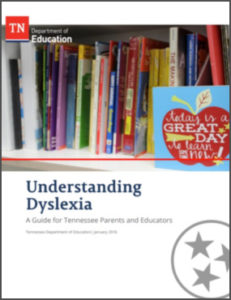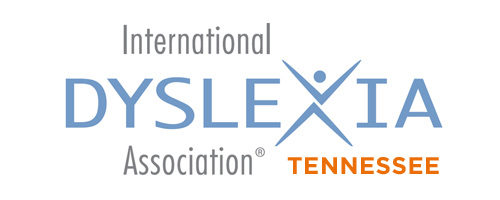
Dyslexia Advisory Council – Helpful Links
In 2016, the Say Dyslexia Law (T.C.A. SS 49-1-299) established requirements for identifying
characteristics of dyslexia and appropriate professional development requirements in the areas
of identification and intervention methods for students with dyslexia. Additionally, the law
outlines roles of local education authorities, the Department of Education, and the Dyslexia
Advisory Council.
The Local Education Authority is responsible for:
- Implementing procedures for identifying characteristics of dyslexia through the universal screening process required by the existing RTI framework
- Convening a school-based-problem-solving team to analyze screening process and progress monitoring data
- Notifying students’ parents and providing them with information and resources regarding dyslexia
- Providing appropriate tiered dyslexia-specific intervention through its existing RTI framework
- Monitoring student’s progress using a tool designed to measure the effectiveness of the intervention
The Department of Education is responsible for:
- Developing procedures for identifying characteristics of dyslexia through the universal screening process required by the existing RTI2 framework
- Providing appropriate professional development resources for educators in the areas of identification and intervention methods for students with dyslexia
The Dyslexia Advisory Council is responsible for:
- Advising the TN Department of Education in matters relating to dyslexia
- Meeting at least quarterly
- Submitting an annual report to education committees in the TN General Assembly
In 2021, the Tennessee Literacy Success Act updated T.C.A. Title 49, Chapter 1; Title 49, Chapter 5; and Title 49, Chapter 6. Key components of this legislation:
- Each LEA and public charter school will provide foundational literacy skills instruction to its students in grades K-3. Foundational literacy skills instruction should be the school’s primary form of instructional programming in English language arts.
- Each LEA and public charter school will provide reading interventions and supports designed to improve a students’ foundational literacy skills to each student identified as having a significant reading deficiency. This can include providing the interventions identified in Tennessee’s RTI2 framework manual.
- Textbooks and instructional materials used to teach students to read will be based on foundational literacy skills instruction unless a waiver is granted.
- Each LEA and public charter school will annually administer a universal reading screener to each K-3 student. The Department of Education must provide a universal screener at no cost to schools. The Department will determine the reading proficiency level scores. Screeners administered to students will not be used to assign accountability determinations for an LEA or school. Results of the screener administered to the students must be sent to the Department of Education.
-
After determining that a student in K-3 has a significant reading deficiency, the LEA or public charter school will notify the student’s parent in writing with:
-
Information about the importance of a student being able to read proficiently at the end of the third-grade level
-
Reading intervention activities that the parent may use with the parent’s student at home to improve reading proficiency
-
Information about the specific reading interventions and supports that the LEA or public charter school recommends for the student, which may include the intervention provided by the RTI2 framework manual.
-
Other Resources
 |
In 2016 the TN Department of Education created the Understanding Dyslexia Guide for Tennessee parents and educators that gives information about what dyslexia is and is not. Additionally, this guide provides insights for effective intervention strategies. |
 |
In 2018 the TN Department of Education created the Dyslexia Resource Guide to assist districts in implementing the Say Dyslexia Law. This document outlines the parts of the Say Dyslexia law and requirements of schools. Additionally, it provides guidance to districts and school personnel defining dyslexia, outlining the characteristics of dyslexia, and identifying how the new dyslexia legislation fits within the RTI2 framework. |
Share this page with your friends…

